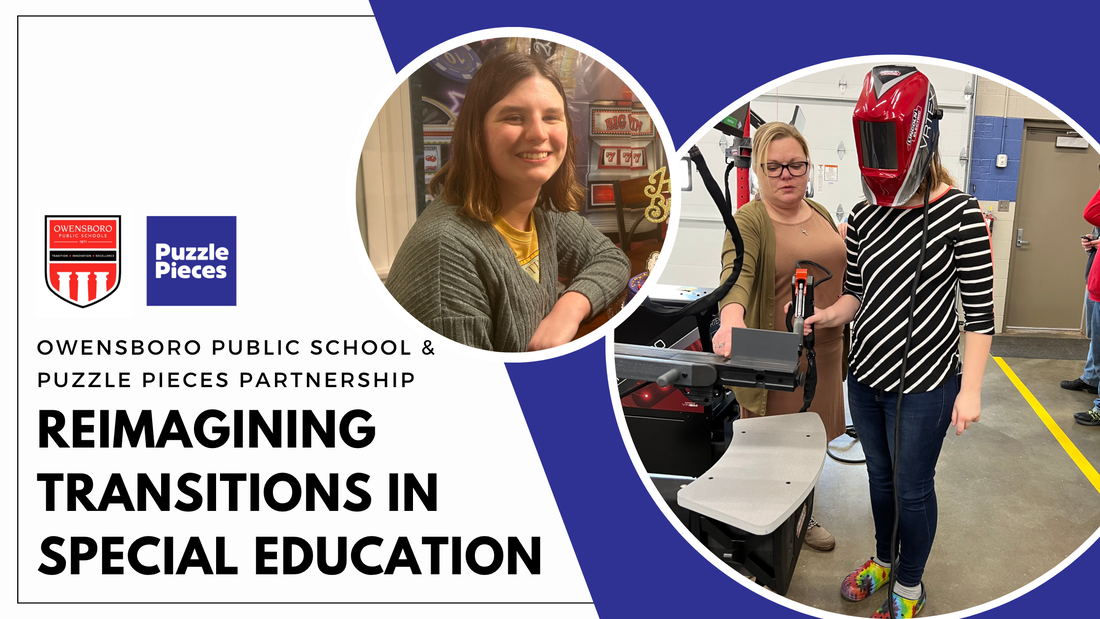|
Madeline Payne is an eleventh grade student at Owensboro Innovation Academy who teachers would have described as shy and reserved, that is until she found her voice thanks to an innovative community partnership with Puzzle Pieces.
Pre-Employment Transition Services (Pre-ETS) prepare students aged 14-21 with an IEP or 504 plan for transition into adulthood, for college enrollment and/or successful employment. This programming focuses on job exploration, work-based learning experiences, counseling on post-secondary education, workplace readiness and self-advocacy. Pre-ETS is funded through Vocational Rehabilitation and can be administered by service providers like Puzzle Pieces. According to OIA Guidance Counselor Jaime Main, Pre-ETS is making a big difference in the lives of the 11 OIA students in the program, including Madeline. “Madeline has not always had the tools to advocate for what she wanted,” Main said. “Starting Pre-ETS allowed her to gain the skills and confidence to have a voice to speak up and challenged her to step outside of her comfort zone to learn about careers she had never thought of before.” Since starting in the program, Madeline started a new club at school, explored several new careers, and even spoke at a meeting in front of 25-30 adults about how much Pre-ETS has helped her excel. For Madeline’s mom, Heather Payne, Pre-ETS has helped answer a lot of questions. “My biggest worry is about what will happen to her when I’m not here anymore,” Heather said. But the Pre-ETS program has opened up a world of possibilities for Madeline, reducing Heather’s worry about her daughter’s future. “The expectation for more is there,” Heather said. “My daughter will be a contributing citizen. She has interests, talents and skills she would have never discovered otherwise. And she sees that she is going to grow up and doesn’t have to stay at home and let other people live their lives without her.” Inspired by the success of this partnership, Owensboro Public Schools Special Education Director Carrie Wedding is partnering with Puzzle Pieces to form a “Transition Think Tank” to look at the bigger picture when it comes to student transitions in special education. “It became clear that we only think of transition as the last phase of a student’s P-12 education,” Wedding said. “The Transition Think Tank is allowing us to re-frame ‘what is transition?’ OPS will be able to begin looking at our students with disabilities not in one year increments, but as contributing members of our community whether they are 3 with an IEP or age 21.” According to Wedding, if a student qualifies for services at age 3, her team needs to think, “What skills do they need to be college, career or independent living ready?” Wedding says that OPS students and teachers will benefit from a clear progression of skills that lead them to a productive adulthood. “This work will allow us to identify clear parameters around what our students need at each grade and then we can designate appropriate resources to make sure teachers are equipped to meet those needs,” she said. Currently, OPS serves 822 students from preschool to grade 14 in special education, who are taught by 64 certified teachers. Puzzle Pieces Executive Director Amanda Owen says that all Kentucky schools face the challenge of improving transition for students with disabilities. “This community partnership with OPS is thinking outside the box in order to ensure students’ success,” Owen said. “The end goal is to champion a model that can be shared and used across multiple districts. We are grateful that OPS is eager to lay the groundwork with this Think Tank and shares our passion for improving the lives of students with disabilities.” Main, who is a part of the Transition Think Tank, has a vested interest in this program’s outcome. Her son, Skyler, was diagnosed with autism at age 4 and attends Cravens Elementary School. Skyler has been attending Puzzle Pieces since he was 8 and she has seen the impact it has made on his life. “As a parent, I hope my son is able to reach his full potential,” Main said. “I want him to gain the skills to be a successful worker and contributing citizen. I want him to be able to advocate for his needs independently. I want him to live in a community where he is accepted for his abilities and challenged to grow just like everyone around him.” According to Main, students with disabilities are missing important transition skills that provide them with the ability to gain and retain independence during school and after graduation. “This collaboration work can help provide families with knowledge and resources to start the process earlier,” she said. “It can also be a tool kit for educators to teach skills to the students beginning in preschool and align those throughout graduation. This process will empower students to learn about their skills and strengths and be the best version of themselves for career or college.”
0 Comments
|


 RSS Feed
RSS Feed